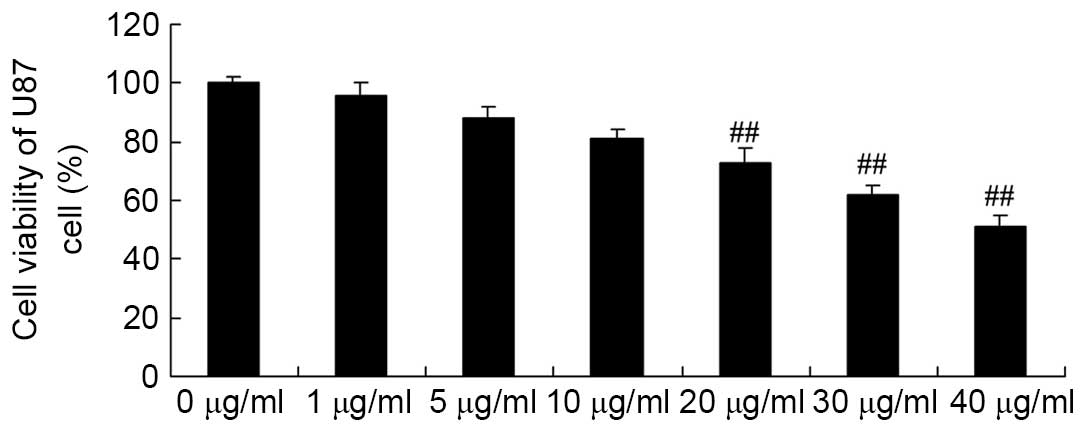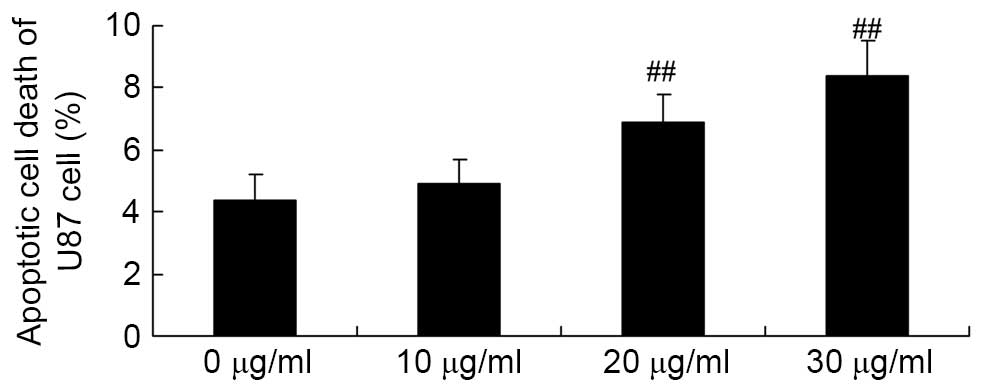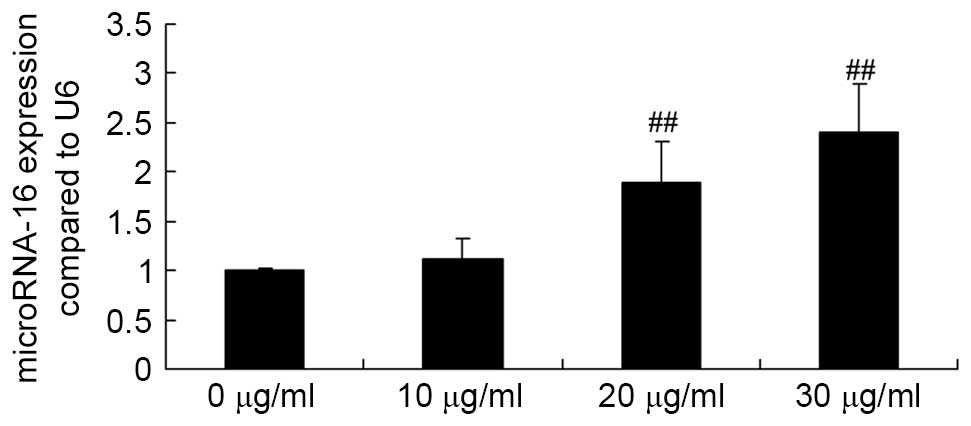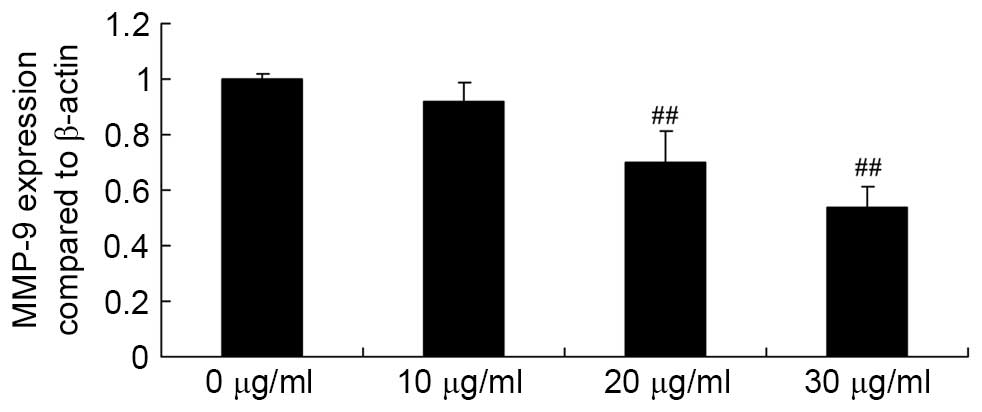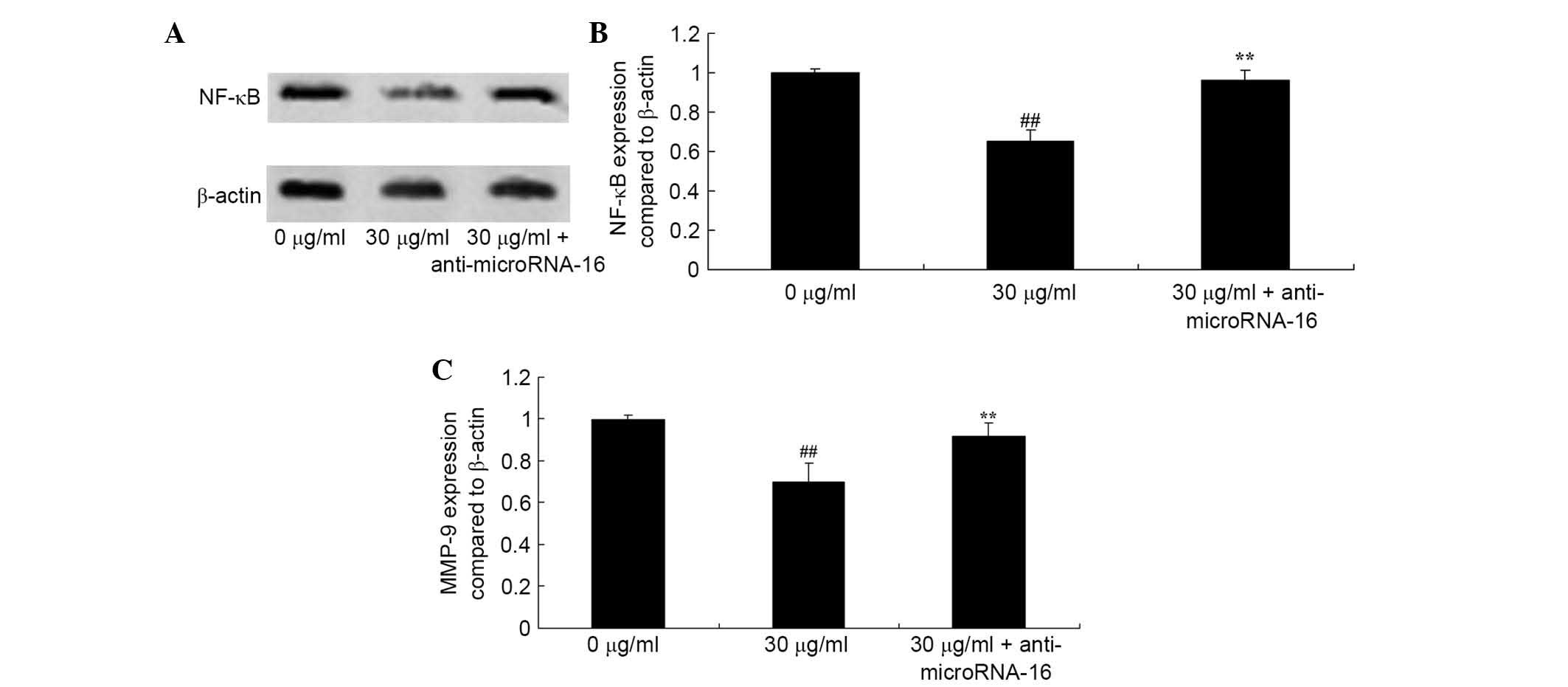|
1
|
Okada H, Kalinski P, Ueda R, Hoji A,
Kohanbash G, Donegan TE, Mintz AH, Engh JA, Bartlett DL, Brown CK,
et al: Induction of CD8+ T-cell responses against novel
glioma-associated antigen peptides and clinical activity by
vaccinations with (alpha)-type 1 polarized dendritic cells and
polyinosinic-polycytidylic acid stabilized by lysine and
carboxymethylcellulose in patients with recurrent malignant glioma.
J Clin Oncol. 29:330–336. 2011. View Article : Google Scholar
|
|
2
|
Diez Valle R, Slof J, Galvan J, Arza C,
Romariz C and Vidal C; VISIONA study researchers: Observational,
retrospective study of the effectiveness of 5-aminolevulinic acid
in malignant glioma surgery in Spain (The VISIONA study).
Neurologia. 29:131–138. 2014.
|
|
3
|
Morrison LC, McClelland R, Aiken C,
Bridges M, Liang L, Wang X, Di Curzio D, Del Bigio MR, Taylor MD
and Werbowetski-Ogilvie TE: Deconstruction of medulloblastoma
cellular heterogeneity reveals differences between the most highly
invasive and self-renewing phenotypes. Neoplasia. 15:384–398. 2013.
View Article : Google Scholar : PubMed/NCBI
|
|
4
|
Ouyang Q, Xu L, Cui H, Xu M and Yi L:
MicroRNAs and cell cycle of malignant glioma. Int J Neurosci.
126:1–9. 2016. View Article : Google Scholar
|
|
5
|
Wang BC and Ma J: Role of MicroRNAs in
Malignant Glioma. Chin Med J (Engl). 128:1238–1244. 2015.
View Article : Google Scholar
|
|
6
|
Hu E, Wang D, Zhang X, Li J, Hu Y, Gong H
and Liu E: Four common polymorphisms in microRNAs and the risk of
adult glioma in a chinese case-control study. J Mol Neurosci.
51:933–940. 2013. View Article : Google Scholar : PubMed/NCBI
|
|
7
|
Feng SY, Dong CG, Wu WK, Wang XJ, Qiao J
and Shao JF: Lentiviral expression of anti-microRNAs targeting
miR-27a inhibits proliferation and invasiveness of U87 glioma
cells. Mol Med Rep. 6:275–281. 2012.PubMed/NCBI
|
|
8
|
Venturutti L, Cordo Russo RI, Rivas MA,
Mercogliano MF, Izzo F, Oakley RH, Pereyra MG, De Martino M,
Proietti CJ, Yankilevich P, et al: MiR-16 mediates trastuzumab and
lapatinib response in ErbB-2-positive breast and gastric cancer via
its novel targets CCNJ and FUBP1. Oncogene. May 9–2016.Epub ahead
of print. View Article : Google Scholar : PubMed/NCBI
|
|
9
|
Chen RW, Bemis LT, Amato CM, Myint H, Tran
H, Birks DK, Eckhardt SG and Robinson WA: Truncation in CCND1 mRNA
alters miR-16-1 regulation in mantle cell lymphoma. Blood.
112:822–829. 2008. View Article : Google Scholar : PubMed/NCBI
|
|
10
|
Han J and Chen Q: MiR-16 modulates
temozolomide resistance by regulating BCL-2 in human glioma cells.
Int J Clin Exp Pathol. 8:12698–12707. 2015.
|
|
11
|
Shi MD, Shiao CK, Lee YC and Shih YW:
Apigenin, a dietary flavonoid, inhibits proliferation of human
bladder cancer T-24 cells via blocking cell cycle progression and
inducing apoptosis. Cancer Cell Int. 15:332015. View Article : Google Scholar : PubMed/NCBI
|
|
12
|
Palmieri D, Perego P and Palombo D:
Apigenin inhibits the TNFalpha-induced expression of eNOS and MMP-9
via modulating Akt signalling through oestrogen receptor
engagement. Mol Cell Biochem. 371:129–136. 2012. View Article : Google Scholar : PubMed/NCBI
|
|
13
|
Zhang S, Liu X, Sun C, Yang J, Wang L,
Gong L and Jing Y: Apigenin attenuates experimental autoimmune
myocarditis by modulating Th1/Th2 cytokine balance in mice.
Inflammation. 39:678–686. 2016. View Article : Google Scholar
|
|
14
|
Suh YA, Jo SY, Lee HY and Lee C:
Inhibition of IL-6/STAT3 axis and targeting Axl and Tyro3 receptor
tyrosine kinases by apigenin circumvent taxol resistance in ovarian
cancer cells. Int J Oncol. 46:1405–1411. 2015.
|
|
15
|
Bruno A, Siena L, Gerbino S, Ferraro M,
Chanez P, Giammanco M, Gjomarkaj M and Pace E: Apigenin affects
leptin/leptin receptor pathway and induces cell apoptosis in lung
adenocarcinoma cell line. Eur J Cancer. 47:2042–2051. 2011.
View Article : Google Scholar : PubMed/NCBI
|
|
16
|
Shukla S and Gupta S: Molecular mechanisms
for apigenin-induced cell-cycle arrest and apoptosis of hormone
refractory human prostate carcinoma DU145 cells. Mol Carcinog.
39:114–126. 2004. View
Article : Google Scholar : PubMed/NCBI
|
|
17
|
Leylabadlo HE, Yekani M and Ghotaslou R:
Helicobacter pylori hopQ alleles (type I and II) in gastric cancer.
Biomed Rep. 4:601–604. 2016.PubMed/NCBI
|
|
18
|
Solomon MT, Selva JC, Figueredo J, Vaquer
J, Toledo C, Quintanal N, Salva S, Domíngez R, Alert J, Marinello
JJ, et al: Radiotherapy plus nimotuzumab or placebo in the
treatment of high grade glioma patients: Results from a randomized,
double blind trial. BMC Cancer. 13:2992013. View Article : Google Scholar : PubMed/NCBI
|
|
19
|
Morokoff A, Ng W, Gogos A and Kaye A:
Molecular subtypes, stem cells and heterogeneity: Implications for
personalised therapy in glioma. J Clin Neurosci. 22:1219–1226.
2015. View Article : Google Scholar : PubMed/NCBI
|
|
20
|
Sizoo EM, Pasman HR, Dirven L, Marosi C,
Grisold W, Stockhammer G, Egeter J, Grant R, Chang S, Heimans JJ,
et al: The end-of-life phase of high-grade glioma patients: A
systematic review. Support Care Cancer. 22:847–857. 2014.
View Article : Google Scholar
|
|
21
|
Siu A, Wind JJ, Iorgulescu JB, Chan TA,
Yamada Y and Sherman JH: Radiation necrosis following treatment of
high grade glioma-a review of the literature and current
understanding. Acta Neurochir (Wien). 154:191–201. 2012. View Article : Google Scholar
|
|
22
|
Yang TQ, Lu XJ, Wu TF, Ding DD, Zhao ZH,
Chen GL, Xie XS, Li B, Wei YX, Guo LC, et al: MicroRNA-16 inhibits
glioma cell growth and invasion through suppression of BCL2 and the
nuclear factor-kappaB1/MMP9 signaling pathway. Cancer Sci.
105:265–271. 2014. View Article : Google Scholar : PubMed/NCBI
|
|
23
|
Li X, Ling N, Bai Y, Dong W, Hui GZ, Liu
D, Zhao J and Hu J: MiR-16-1 plays a role in reducing migration and
invasion of glioma cells. Anat Rec (Hoboken). 296:427–432. 2013.
View Article : Google Scholar
|
|
24
|
Wang Q, Li A, Wang H and Wang J: Knockdown
of apoptosis repressor with caspase recruitment domain (ARC)
increases the sensitivity of human glioma cell line U251MG to
VM-26. Int J Clin Exp Pathol. 5:555–561. 2012.PubMed/NCBI
|
|
25
|
Jia G, Wang Q, Wang R, Deng D, Xue L, Shao
N, Zhang Y, Xia X, Zhi F and Yang Y: Tubeimoside-1 induces glioma
apoptosis through regulation of Bax/Bcl-2 and the ROS/Cytochrome
C/Caspase-3 pathway. Onco Targets Ther. 8:303–311. 2015.PubMed/NCBI
|
|
26
|
Li CL, Chang L, Guo L, Zhao D, Liu HB,
Wang QS, Zhang P, Du WZ, Liu X, Zhang HT, et al: beta-elemene
induces caspase-dependent apoptosis in human glioma cells in vitro
through the upregulation of Bax and Fas/FasL and downregulation of
Bcl-2. Asian Pac J Cancer Prev. 15:10407–10412. 2014. View Article : Google Scholar
|
|
27
|
Wick W, Wild-Bode C, Frank B and Weller M:
BCL-2-induced glioma cell invasiveness depends on furin-like
proteases. J Neurochem. 91:1275–1283. 2004. View Article : Google Scholar : PubMed/NCBI
|
|
28
|
Yang TQ, Lu XJ, Wu TF, Ding DD, Zhao ZH,
Chen GL, Xie XS, Li B, Wei YX, Guo LC, et al: MicroRNA-16 inhibits
glioma cell growth and invasion through suppression of BCL2 and the
nuclear factor-kappaB1/MMP9 signaling pathway. Cancer Sci.
105:265–271. 2014. View Article : Google Scholar : PubMed/NCBI
|
|
29
|
Zhu LB, Jiang J, Zhu XP, Wang TF, Chen XY,
Luo QF, Shu Y, Liu ZL and Huang SH: Knockdown of Aurora-B inhibits
osteosarcoma cell invasion and migration via modulating
PI3K/Akt/NF-kappaB signaling pathway. Int J Clin Exp Pathol.
7:3984–3991. 2014.
|
|
30
|
Du Z, Whitt MA, Baumann J, Garner JM,
Morton CL, Davidoff AM and Pfeffer LM: Inhibition of type I
interferon-mediated antiviral action in human glioma cells by the
IKK inhibitors BMS-345541 and TPCA-1. J Interferon Cytokine Res.
32:368–377. 2012. View Article : Google Scholar : PubMed/NCBI
|
|
31
|
Kesanakurti D, Chetty C, Bhoopathi P,
Lakka SS, Gorantla B, Tsung AJ and Rao JS: Suppression of MMP-2
attenuates TNF-alpha induced NF-kappaB activation and leads to JNK
mediated cell death in glioma. PLoS One. 6:e193412011. View Article : Google Scholar
|
|
32
|
Chang X, He H, Zhu L, Gao J, Wei T, Ma Z
and Yan T: Protective effect of apigenin on Freund's complete
adjuvant-induced arthritis in rats via inhibiting P2X7/NF-κB
pathway. Chem Biol Interact. 236:41–46. 2015. View Article : Google Scholar : PubMed/NCBI
|
|
33
|
Jiang L, Wu J, Yang Y, Liu L, Song L, Li J
and Li M: Bmi-1 promotes the aggressiveness of glioma via
activating the NF-kappaB/MMP-9 signaling pathway. BMC Cancer.
12:4062012. View Article : Google Scholar : PubMed/NCBI
|
















